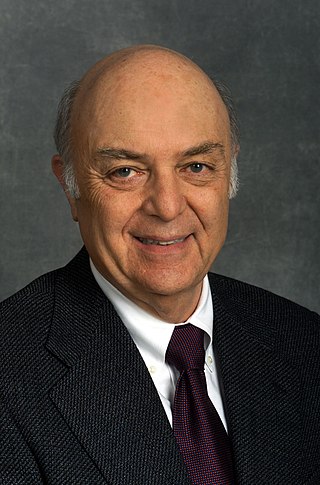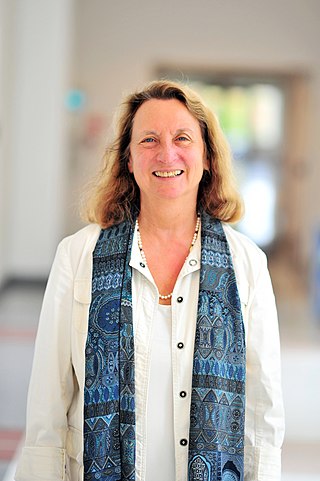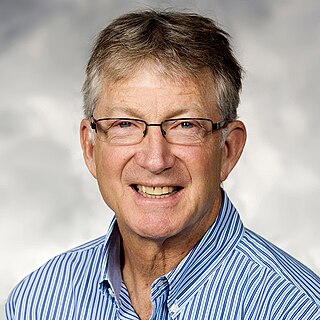Related Research Articles

Henry Frederick "Fritz" Schaefer III is a computational and theoretical chemist. He is one of the most highly cited chemists in the world, with a Thomson Reuters H-Index of 121 as of 2020. He is the Graham Perdue Professor of Chemistry and Director of the Center for Computational Chemistry at the University of Georgia. Before becoming professor at Georgia he was professor at University of California, Berkeley and in 2004, he became Professor of Chemistry Emeritus, at UC Berkeley

Marvin Lou Cohen is an American–Canadian theoretical physicist. He is a physics professor at the University of California, Berkeley. Cohen is a leading expert in the field of condensed matter physics. He is widely known for his seminal work on the electronic structure of solids.
Paul Lyon Houston is Professor Emeritus of Chemistry at Cornell University and Professor Emeritus of Chemistry and Biochemistry at the Georgia Institute of Technology.

Michael Lawrence KleinNAS is Laura H. Carnell Professor of Science and director of the Institute for Computational Molecular Science in the college of science and technology at Temple University in Philadelphia, US. He was previously the Hepburn Professor of Physical Science in the Center for Molecular Modeling at the University of Pennsylvania. Currently, he serves as the dean of the college of science and technology and has since 2013.
Roberto Car is an Italian physicist and the Ralph W. Dornte *31 Professor in Chemistry at Princeton University, where he is also a faculty member in the Princeton Institute for the Science and Technology of Materials. He conducts research on the simulation of molecular dynamics phenomena.
Sauro Succi is an Italian scientist, internationally credited for being one of the founders of the successful Lattice Boltzmann method for fluid dynamics and soft matter.

Robert Joseph Cava is a solid-state chemist at Princeton University where he holds the title Russell Wellman Moore Professor of Chemistry. Previously, Professor Cava worked as a staff scientist at Bell labs from 1979–1996, where earned the title of Distinguished Member of the Technical Staff. As of 2016 his research investigates topological insulators, semimetals, superconductors, frustrated magnets and thermoelectrics.

James R. Chelikowsky is a professor of physics, chemical engineering, chemistry and at The University of Texas at Austin. He is the director of the Institute for Computational Engineering and Sciences' Center for Computational Materials. He holds the W.A. "Tex" Moncrief Jr. Chair of Computational Materials.

Yitzhak Apeloig is a pioneer in the computational chemistry field of the Ab initio quantum chemistry methods for predicting and preparing the physical and chemical properties of materials. He was the president of the Technion from 2001 until 2009 where the position was handed off to Peretz Lavie. Distinguished Prof. Apeloig currently holds the Joseph Israel Freund Chair in Chemistry and is the co-director of the Lise Meitner Minerva Center for Computational Quantum Chemistry at the Technion. He served as dean of the Faculty of Chemistry from 1995 to 1999, where he was named Teacher of the Year at three occasions.

Elaine Surick Oran is an American physical scientist and is considered a world authority on numerical methods for large-scale simulation of physical systems. She has pioneered computational technology to solve complex reactive flow problems, unifying concepts from science, mathematics, engineering, and computer science in a new methodology. An incredibly diverse range of phenomena can be modeled and better understood using her techniques for numerical simulation of fluid flows, ranging from the tightly grouped movements of fish in Earth's oceans to the explosions of far-flung supernovae in space. Her work has contributed significantly to the advancement of the engineering profession.
Claudia Felser is a German solid state chemist and materials scientist. She is currently a director of the Max Planck Institute for Chemical Physics of Solids. Felser was elected as a member into the National Academy of Engineering in 2020 for the prediction and discovery of engineered quantum materials ranging from Heusler compounds to topological insulators.

Emily Ann Carter is the Gerhard R. Andlinger Professor in Energy and the Environment and a professor of mechanical and aerospace engineering, the Andlinger Center for Energy and the Environment, and the Program in Applied and Computational Mathematics at Princeton University. She has been on the faculty at Princeton since 2004, including as serving as Princeton's Dean of the School of Engineering and Applied Science from 2016 to 2019. She moved to UCLA to serve as executive vice chancellor and provost and a distinguished professor of chemical and biomolecular engineering, before returning to Princeton in December 2021. Carter is a theorist and computational scientist whose work combines quantum mechanics, solid-state physics, and applied mathematics.
Shaul Mukamel is a chemist and physicist, currently serving as a Distinguished Professor at the University of California, Irvine. He is known for his works in Non linear Optics and Spectroscopy.
Anna Christina Balazs is an American materials scientist and engineer. She currently is Distinguished Professor at the University of Pittsburgh and holds the John A. Swanson Chair at the Swanson School of Engineering.
John D. Joannopoulos is an American physicist, focused in condensed matter theory. He is currently the Francis Wright Davis Professor of Physics at Massachusetts Institute of Technology, an Elected Member of the National Academy of Sciences (NAS), an Elected Member of the American Academy of Arts and Sciences (AAA&S), and an Elected Fellow of the American Association for the Advancement of Science (AAAS) and American Physical Society (APS).
Peter David Drummond is a physicist and distinguished professor in the Centre for Quantum and Optical Science at Swinburne University of Technology.

James L. Skinner is an American theoretical chemist. He is the Joseph O. and Elizabeth S. Hirschfelder Professor Emeritus at the University Wisconsin-Madison. He is also a member of the Scientific Advisory Board of the Welch Foundation. Most recently, Skinner was the Crown Family Professor of Molecular Engineering, professor of chemistry, director of the Water Research Initiative and deputy dean for faculty affairs of the Pritzker School of Molecular Engineering at the University of Chicago. Skinner is recognized for his contributions to the fields of theoretical chemistry, nonequilibrium statistical mechanics, linear and nonlinear spectroscopy of liquids, amorphous and crystalline solids, surfaces, proteins, and supercritical fluids. Skinner is the co-author of over 230 peer-reviewed research articles.

Prineha Narang is an American physicist and computational material scientist. She is a Professor of Physical Sciences and Howard Reiss Chair at the University of California, Los Angeles (UCLA). Narang currently serves as a U.S. Science Envoy approved by the Secretary of State to identify opportunities for science and technology cooperation. Before moving to UCLA, she was first an Environmental Fellow at Harvard University Center for the Environment and then an Assistant Professor in the John A. Paulson School of Engineering and Applied Sciences at Harvard University. Narang’s work has been recognized internationally by many awards and a variety of special designations, including the Mildred Dresselhaus Prize, the 2021 IUPAP Young Scientist Prize in Computational Physics, a Friedrich Wilhelm Bessel Research Award from the Alexander von Humboldt Foundation, and a Max Planck Sabbatical Award from the Max Planck Society. Narang also received a National Science Foundation CAREER Award in 2020, was named a Moore Inventor Fellow by the Gordon and Betty Moore Foundation for the development for a fundamentally new strategy for single molecule sensing and environmental toxin metrology using picoscale quantum sensors, CIFAR Azrieli Global Scholar by the Canadian Institute for Advanced Research, and a Top Innovator by MIT Tech Review. Narang was awarded a Guggenheim Fellowship in 2023.
Hai-Ping Cheng is a Chinese-American physicist whose "research crosses the boundaries between many sciences, such as chemistry, materials science, and engineering". Much of her research concerns the computational simulation of nanostructures, including nanowires and nanotubes. She is also a member of the LIGO Scientific Collaboration, with whom she is a coauthor of highly cited work on binary black holes and the gravitational waves they emit. She is a professor of physics at the University of Florida, where she directs both the Quantum Theory Project and the Center for Molecular Magnetic Quantum Materials.
Jose Luis Mendoza-Cortes is a theoretical condensed matter physicist and material scientist specializing in computational physics, materials science, chemistry, and engineering. His studies include methods for solving Schrödinger's or Dirac's equation, machine learning equations, among others. These methods include the development of computational algorithms and their mathematical properties.
References
- ↑ GeorgiaTech webpage
- 1 2 3 "Uzi Landman". Georgia Tech. Retrieved October 5, 2020.
- ↑ "APS Fellow Archive". APS. Retrieved October 5, 2020.
- ↑ Landman is awarded Humboldt prize